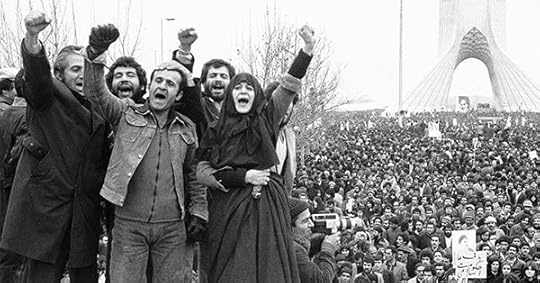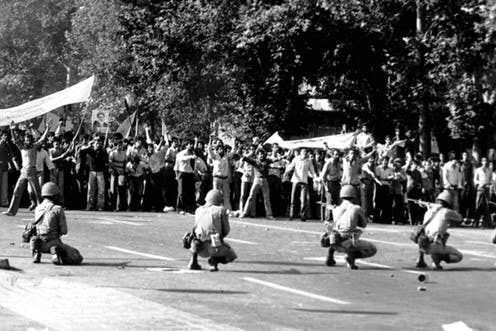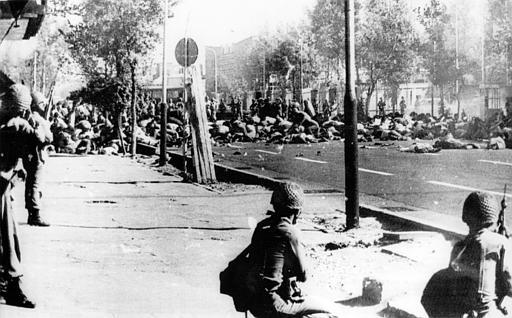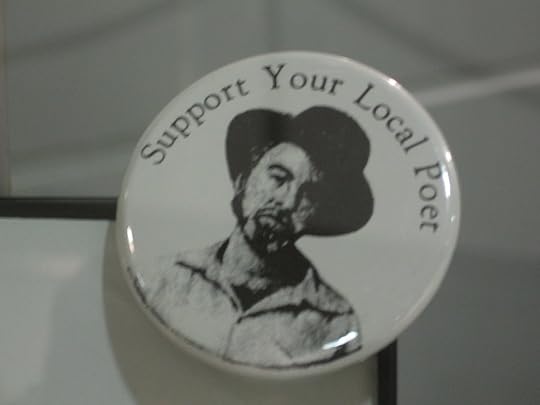Forrest Pritchard's Blog, page 8
February 15, 2019
The Iranian Revolution
The Iranian Revolution resulted in a brutal autocrat being overthrown, but it came at the expense of thousands of lives, as well as the outside world’s view of Iran as a fundamentalist, religious dictatorship.
The story of Iran’s revolution can be traced to the Shah’s father, Reza Khan. Reza Khan was an officer in the Persian Military under the Qajar dynasty. However, Reza did not like the ruling monarchs as the nation of Persia was controlled by the British and the Russians because of the vast amounts of oil in Persia. In 1921, Reza Khan staged a coup against the ruling Qajars, assumed the throne as the new Shah, and was renamed Reza Shah. Thus beginning the Pahlavi dynasty.
The new Shah set to modernize the nation of Persia by building roads and railways across the nation. He also wished for his nation to be recognized as something new, so he changed the name of Persia to Iran, as that was what the nation was called in Farsi (or Persian). His rule was not without harshness, as he confiscated estates in order to gain funds for his government and the army. This caused the Clergy to not support him, as he was taking away from the traditional values of the old Persia. The Shah also sought to end the foreign influence in Iran, namely the Soviet Union and the British. This led him to sympathize with Adolf Hitler in the Second World War.
This alarmed the British and the Soviets, so they invaded Iran in 1941. Once the Soviets and British won against Iran, they forced Reza Shah to abdicate in favor of his son, Mohammad Reza Shah. Like his father before him, the Shah’s son continued to modernize Iran.
In 1953, things took a turn politically as the Prime Minister, Mohammad Mossadegh nationalized the oil industry. The CIA engineered a coup against the Prime Minister. Once he left office, this increased the Shah’s power as he was now backed up by the west. Seeking to make the nation of Iran more western, the Shah started a series of reforms in 1963 called “The White Revolution.” There were more schools and more infrastructure. Oil revenues also rose. But, the White Revolution was criticized by the Clergy. They claimed that the Shah was a western puppet as he was rigging elections and holding extensive power neglect of the poor. One particular clergyman named Ruhollah Khomeini criticized the Shah for his power and his progressive policies. He claimed the White Revolution would give more rights to women.
It was true that the Shah had a lot of power. He was an autocrat, as he tortured political prisoners mercilessly. He used his secret police, the SAVAK, to brutally silence any political opposition. In 1975, he gained more power as he abolished the two parties in the Parliament and formed his own party. As he did not tolerate communism, the Shah had the west’s support.
Apart from his political ruthlessness, and his absolute power, the population started to view the Shah as a western puppet because of the way western culture was imposed as an ideal upon the Iranian populous. This didn’t help the Shah gain any more support from the clergy.
The rapid expansion of the economy didn’t sit well with the people either as farmers did not have jobs because of mechanization of farming. Universities had more graduates than there were jobs. The economy had expanded too far. The people now grew unsatisfied with the Shah. His autocracy, political brutality, and the view of him as a western puppet drove the people to protest in 1978.
Initial protests were peaceful but, as the Shah had not tolerated political opposition before, he sent the Army to deal with the protesters. Violence broke out as the Army shot at protesters. But, instead of quelling the protests, the shootings convinced more people to protest.

The situation descended into chaos as the people retaliated to the soldiers by throwing stones at them. Bloody massacres ensued with horrible brutality such as Black Friday. On September 8, 1978, shooting broke out, and between 84-88 people were killed.

Other horrific incidents occurred such as the Rex Cinema Fire. On August 19, 1978, men locked the doors to the Rex Cinema and lit the building on fire. The Police stopped anyone from trying to help the people inside and the Fire Department didn’t arrive until thirty minutes later. That night, 420 innocent people lost their lives.
The Clergy gave their support to the revolutionaries which was very important as there was a firm establishment backing the revolution and not just the people. Eventually, after so much bloodshed, Mohammad Reza Shah abdicated on February 11th, 1979.
Two weeks after the Shah fled Iran, Ruhollah Khomeini returned to Iran. He installed an Islamic Republic. This radically changed the government and Iran as it resented western culture. Khomeini established himself as a religious supreme leader. This new government acted in the name of God in its policies. The new Islamic Republic started to reverse the Shah’s policies. The government banned “Western” goods such as cards, chess sets and alcohol. To keep these policies enforced, the new government set up the Guardians of the Revolution. They also protected the new government against any coup attempts. Apart from bans on western goods, the Islamic Republic set up other conservative religious policies such as making women wear head scarfs. Any protests against these policies were brutally put down by the Guardians of the Revolution.
There was a heavy sense of repression as music tapes, alcohol, cards or makeup were items on the black market. Any person caught with these were severely punished. Women now had to wear head scarfs outside and could be punished. Examples of people punished lined the streets of Tehran with people seen hanging by construction cranes.
United States and Iranian relations suddenly turned very tense when the fleeing Shah was given refuge in the United States. Angry Iranians flooded the streets of Tehran shouting “Death to America.” The mob broke into the U.S embassy and held the workers hostage. The members of the U.S embassy were held in captivity for 444 days.
The Iranian Revolution resulted in a brutal autocrat being overthrown, but it came at a cost of starting a chaotic period in which thousands lost their lives in the revolution and the Iran Iraq war. It changed the course of history for the middle east, and the world.
February 10, 2019
Farm Poem #3
The Super Bowl was trotted out yet again last week, an event that would have entirely escaped my attention if it hadn’t been for an agricultural brouhaha surrounding a Bud Light commercial. Forgive me for not actually seeingthe commercial in real time, or even going back and watching it after the fact; I spared myself this optical indigestion by hearing it blared through the headlines.
From what I’ve been able to decipher, Bud Light aired an ad pushing against corn syrup, and America’s grain farmers–who were all ears–took umbrage. Turns out this country ain’t big enough for two golden nostrums! Of course a social media showdown quickly ensued (cue bow-legged lobbyists flourishing limp-wristed pistols at the Not-OK-Corral). Trigger fingers were triggered! Tweets were fired! Facebookers liked/didn’t like certain posts! In short, it was another 45 minute news cycle.
Here’s my world-weary take on it:
 –I demand at least 4 swirls. Grandma said never settle–
–I demand at least 4 swirls. Grandma said never settle–Farm Poem #3
Bud Light is at war with agribusiness,
A super bowl of big mouths:
King Corn versus the King of Beers,
Where farmers score points by
Pouring soil down the sink.
How fitting, a battle down the tubes,
On the tubes, in our tubes–
Nostalgic as milk and Cheerios,
But different.
No! The same!
Take your bowl of beer and grain
And slurp it up your corn hole.
Dilly dilly, silly!
We are what you eat.
Kings are always
The first to inform us
There can only be
One king.
January 31, 2019
Farm Poem #2
 —rotten post, a real farm classic—
—rotten post, a real farm classic—Farming is commonly the stressor and the therapy both at once. Some crazy job! The trick, of course, is being grateful for the good, and maintaining healthy perspective regarding the not-so-good. Again, quite a task. No doubt, it can be a lot to process; for me, writing helps. Here’s an example:
Farm Poem 2
To our lady of broken boards,
Saints of rotted fence posts,
Guardian angels of leaking barn roofs;
To ghosts of harvests failed,
Shades of pastures paltry,
Spirits of humus future;
To the Jesus of bent nails,
Buddha of clogged filters,
Vishnu of dead batteries,
We leave our skin, scraped and torn,
Our hands, our knuckles—
To DJs of dubious country lyrics,
Pink cammoed confederates,
Dating sites of bucolic animosity;
To two-star Yelp reviewers of February eggs,
Arugula-shaming Facebookies,
Instagrammers of self-anointed pulchritude;
To politicians feckless and infecund,
Thirty-nine cent turkey hucksters,
Fuelers and feeders who gaslight fooders;
Our self-righteous indifference hard-won,
We leave a thousand mile stare—
To petri-petro-burger enablers,
Vegan bacon warriors,
Flexitarians of prodigious fluctuations;
To lines eternal at Chick-fil-A,
Invisaligned teeth ribboned with flesh,
Mouths stretch-stuffed with white feathers;
To daydream dreamers of perfect sleeps;
Nightmare-sleepers of Saturday nights;
Lucid dreams of re-dreamed workdays;
We leave the numbers of our therapists—
Talking our way to stillness, dollars forever well-spent—
And to carrots comically entwined,
Baler twine torqued into pristine knots,
Stars dropped like matches from midnight skies;
To fragrantly seasoned firewood,
Broken-in brown coats,
6,000 hour tractors;
To dogs mostly good,
Milk-eyed barn cats,
The goat that talked us out of goats;
To exes of inestimable patience,
Spouses and partners of inestimable patience,
Future lovers of inestimable patience,
We leave heart-shaped stones,
Unpocketed haphazard on the hearth,
Plucked fresh from the tilth
Where soil, once clinging, crumbles.
January 22, 2019
Farm Poem #1
Last week, Mary Oliver died. Foremost among the many reasons I admired Oliver was for her accessibility. Her charm, in my opinion, was found in her ability to turn high-minded observations into bouquets of plain-speak. All great poets have a way with words. But my favorites, like Mary Oliver, allow words to reveal the way.
Like Oliver, I’ve always been enormously influenced by Walt Whitman. Whitman spent his entire life revising his magnum opus, Leaves Of Grass–a living canon if ever there was. If you haven’t picked it up lately, I encourage you to do so: it is deeply alive, jumping off the page, prescient and vital for the 21st century. Understand that Whitman was our first grass-finished poet!
Oliver, like Whitman, understood that writing requires a pulse; that words, like everything alive, ultimately result from photosynthesis. Energy is eternal. Micro is macro. The temporal is holy. To our endless delight, Mary Oliver revealed this over and over.
In honor of my favorite poets–and to provide some minor meditation in my own life–I’m starting a new weekly series called Farm Poems. I plan to write fifty-two, and see where they lead. They will be thoughts, portraits, musings and devotions to my farm, Smith Meadows, and to the daily turn of the calendar. Good poems and good farms should be synonyms. I hope you enjoy them.
 –Light through January walnuts–
–Light through January walnuts–Farm Poem #1
January is as constant as it can’t,
Warm with snow,
Gray with color,
Darkness blinding bright.
The creek, of course, runs on,
Rimed with ice,
Steam above the spring,
And there the watercress waits,
Tresses like fair Ophelia,
Just beneath the surface
To be.
September 9, 2018
(Very Good) Reviews of the New Book…
It’s here! It’s in stock (in paperback, e-book, and Audible)! And it’s getting 5-star reviews! Check out this glowing review from Green Willow Homestead:
The perfect gift for the “farm dreamer” in your life… especially if that farm dreamer is YOU!
June 9, 2018
New Book On The Way!
 Excited to announce that Start Your Farm debuts on Sept 4, 2018! Click here to learn more, and preorder: PREORDER
Excited to announce that Start Your Farm debuts on Sept 4, 2018! Click here to learn more, and preorder: PREORDER
October 11, 2017
Musings on Soil, Society, & Prescient Poets
September 19, 2017
Spirit, Soil, Sweat
Photojournalists Kent Deitemeyer and John Gevers visit Smith Meadows, and the results are extraordinary. Story HERE
 Smith Meadows Farm, Berryville, Virginia USA
Smith Meadows Farm, Berryville, Virginia USA
June 9, 2017
Brief Interviews with Brave Farmers
April 16, 2017
Indiana Interview & Ohio Audio
HERE: http://www.johngevers.com/blog-stewards-of-the-heartlands/farmer-and-bestselling-author-forrest-pritchard-visits-the-heartland
&
HERE: https://soundcloud.com/wtsc-radio/forrest-pritchard-author-of-gaining-ground-03-31-17?utm_source=soundcloud&utm_campaign=share&utm_medium=facebook
Forrest Pritchard's Blog
- Forrest Pritchard's profile
- 26 followers





